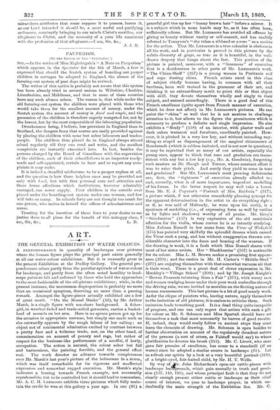PAUPERISM.
[TO THE EDITOR OF THE "SPECTATOR.]
SIR,—In the notice of Miss Nightingale's "A Note on Pauperism" which appears in the Spectator for the 6th of March, a fear is expressed that should the Scotch system of boarding out pauper children in cottages be adopted in England, the abuses of the farming-out system of past days might be revived.
The writer of this notice is probably not aware that this system has been already tried in several unions in Wiltshire, Cheshire, Lincolnshire, and Middlesex, and that in none of these counties have any such abuses arisen. The reason is, that while under the old farming-out system the children were placed with those who would take them for the smallest amount of money, under the Scotch system the amount of money is fixed and ample, and the possession of the children is therefore eagerly competed for, not by the lowest, but by the most respectable of the labouring population.
Drunkenness being, I believe, less prevalent in England than in Scotland, the dangers from that source are easily provided against by placing the children with none but sober labourers and tradespeople. The children thus placed do in England always attend school regularly till they can read and write, and the smallest complaints are instantly examined into. In fact, besides the persons charged by the Board of Guardians with the supervision of the children, each of their schoolfellows is an inspector readymade and self-appointed, certain to hear and to report any complaints it may make.
It is indeed a dreadful misfortune to be a pauper orphan at all, and the question is how these helpless ones may be provided not only with food, but with that personal care and attention and those home affections which institutions, however admirably managed, can never supply. Four children is the outside ever placed under the boarding-out system under one woman, and few will take so many. In schools forty are not thought too much for one person, who unites in herself the offices of schoolmistress and nurse.
Trusting for the insertion of these lines to your desire to see justice done to all plans for the benefit of this unhappy class, I am, Sir, &c., L. B.


































 Previous page
Previous page